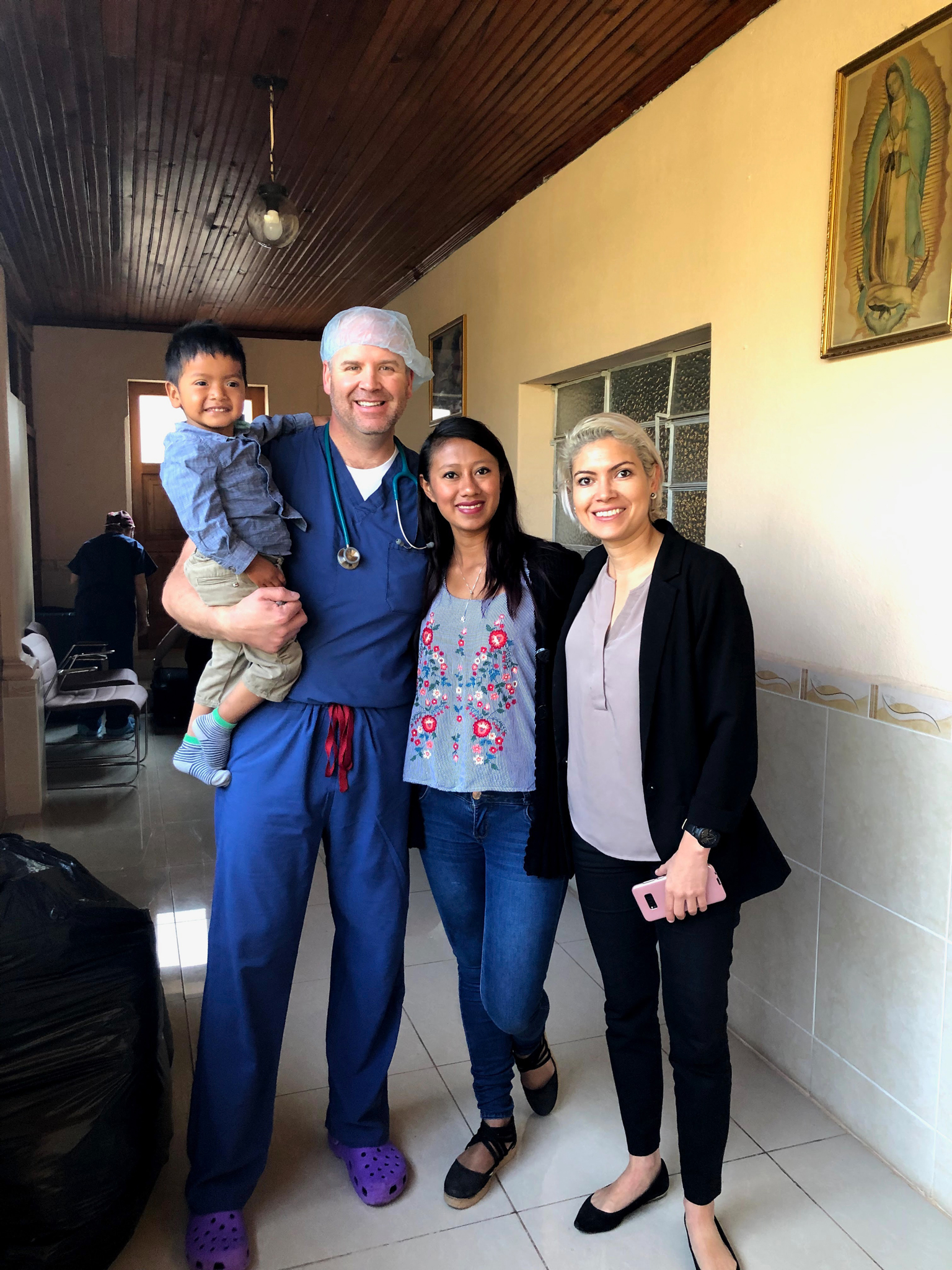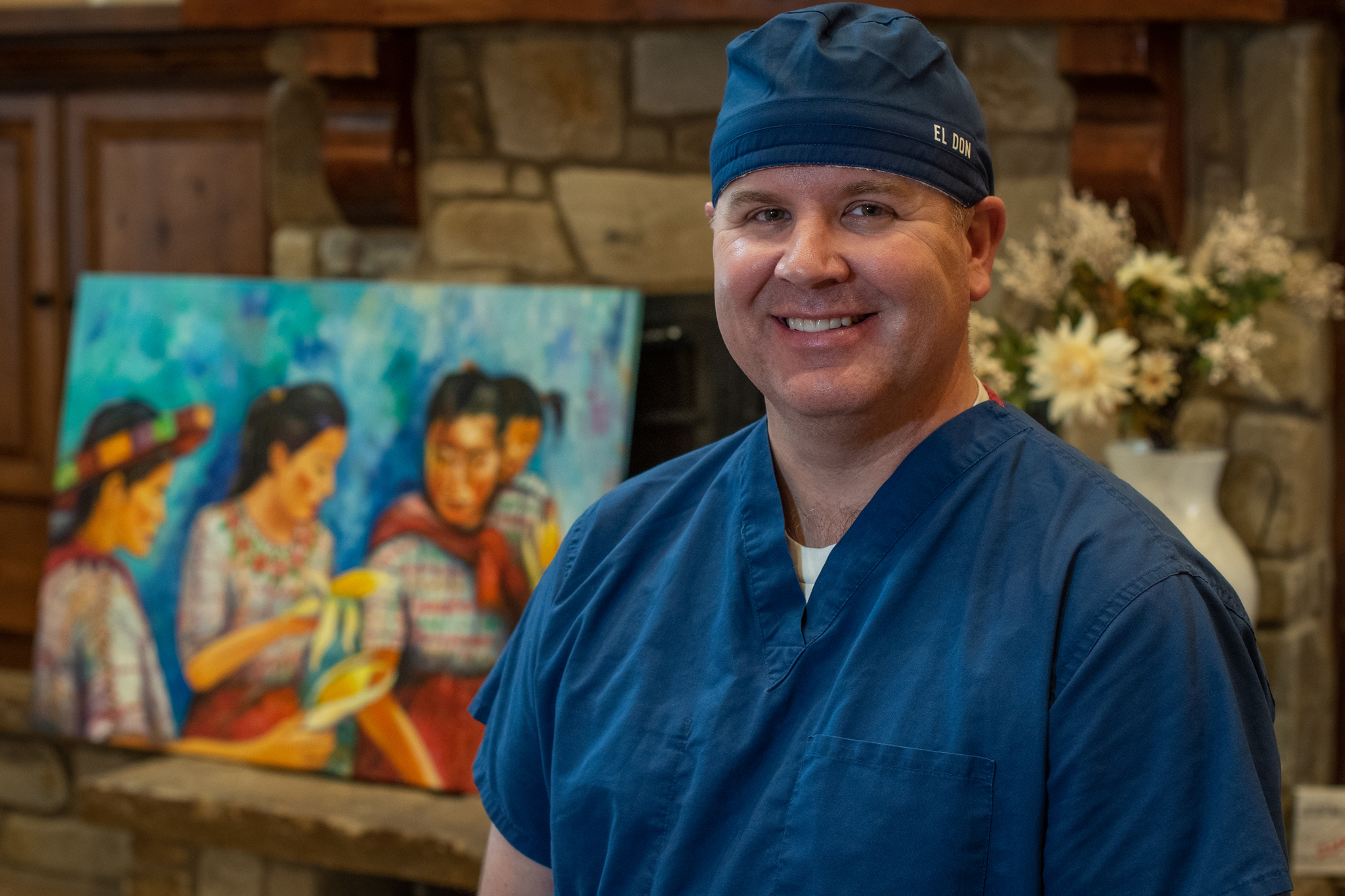Lake Atitlan is the kind of place you want to keep your eyes on.
Ringed by steep volcanoes and verdant hills, the lake’s jewel-toned waters glint in the sun like a mirror. Around the water’s shoreline nestle towns and tiny villages, each a mosaic of colors. If it’s a feast for the eyes you’re after, you could spend a lifetime looking here.
But Efrain hadn’t seen the beauty of his lakeside hometown of Sololá, Guatamala in years. At 29 years old, he was completely blind.
He’d started developing cataracts a few years prior as a result of untreated diabetes. Now, he couldn’t work to feed his young daughter. In fact, it had been years since he’d been able to truly see his daughter’s face.
Two hours from the nearest big city, Sololá’s residents didn’t have much access to quality healthcare. And in a region predominantly populated by indigenous Maya people, Efrain faced the hurdles of prejudice and poverty in regaining his sight.
So the next time Mike Oswald and his group of medical volunteers came to town, the community sprung into action. The villagers scraped together the money needed to get Efrain the surgeries he needed – first one eye, then the other a couple of months later.
If not for that mission, it’s likely Efrain would never have gotten together the $400 needed to get that operation at a national hospital in Guatemala. Thanks to a collaboration between Oswald’s nonprofit ALMA and a group of local doctors and social workers, dozens of people like Efrain can now see through the fog of pain.
“He’s seeing 20/20 now,” Oswald said. “And he got to recover at home, surrounded by people he knows and who care for him, instead of being whisked off to a strange operating room full of gringos.”
Oswald, a Coeur d’Alene resident, started visiting Guatemala in 2007 with the International Eye Institute. He’d served a mission to Colombia with the Church of Jesus Christ of Latter-day Saints as a young man, where he got the hang of Spanish and discovered a passion for service.
Oswald became a nurse anesthetist back in Idaho, and once or twice a year he’d take a week off from his full-time job and four children at home to assist with medical missions to small towns around Lake Atitlan. But he found himself wanting more from those missions.
“It was arriving on a Sunday, doing all these pre-op visits, scheduling surgeries throughout the week and we’re gone by Friday or Saturday,” Oswald said. “And they may or may not have proper follow-up once we leave. So I was kind of intrigued – what can we be doing better here?”
Oswald saw a lack of communication between the local experts and American doctors who often had only a week to address the dozens of latent medical problems in a village. He knew there were locals with the skills and knowledge needed to change the way medical missions were done in Sololá.
So Oswald and his wife Teresa started their nonprofit, ALMA, out of their Coeur d’Alene home in 2018. The name in English is an acronym for “A Love for Missions Abroad” – but in Spanish, it’s the word for “soul.”
Oswald teamed up with Virginia Loza, an ophthalmologist who had turned down a comfortable life in Guatemala City to serve the people of Sololá. Her eye clinic was working to address the needs of low-income locals, too – she was a “year-round missionary” in Oswald’s eyes.
ALMA also linked up with a general surgeon, Julio Estrada, who could repair hernias and remove gallbladders, addressing serious problems that often went ignored because local people didn’t have the time and money to see a doctor. They hired a local social worker that could visit patients in their homes, determining their needs and checking in on them after surgery. Now, the idea of fixing those long-ignored aches and pains was no longer so far out of reach or so scary.
When ALMA came to town, they brought much-needed resources and equipment – a welcome addition in a country where doctors often reuse disposable tools or “MacGyver” the equipment they lack, Oswald said. And when Oswald would visit Sololá a couple of times each year, he’d bring a team of volunteers ready to share their medical expertise.
“Where we could usually only do a few surgeries every week, we can do close to 40 with the mission teams,” Oswald said.
Now, though, Oswald’s been shut out of Guatemala for nearly a year – longer than he’s ever gone without touching base in the region. With COVID-19 restrictions locking down the United States and Guatemala alike, ALMA is facing some strain.
According to Loza, the Guatemalan healthcare system is faulty under the best of circumstances. There are no public hospitals with ophthalmologists on staff around Lake Atitlan, and surgeries for other ailments are out of reach for Sololá residents who typically live on $5 or less a day, Loza said.
Then when coronavirus hit, villagers who made their living selling wares in town markets were locked down at home. Crops that could have gone to market rotted while farmers and fishermen went hungry. The country’s already-overstretched hospitals reached their breaking points.

From his living room in Coeur d’Alene, Oswald – known in Sololá by the honorific “Don Miguel” – kept in touch with his troops on the ground in Guatemala via endless WhatsApp chats and bulky cardboard boxes of medical equipment heading to Sololá from his local FedEx office. ALMA’s donors helped distribute flour, eggs and other necessities to over 100 families through their social worker to get them through the lockdown.
The supplies and support were more sorely needed than ever, but Oswald and his surgical partners wanted to ensure life-changing surgeries were still possible until he could come back to help in person.
For the first two years, ALMA’s funding had come from small donations here and there, but a big chunk had come from Oswald’s own pockets. He wanted to bring more like-minded donors into the fold. So he struck a deal – the surgeons in Sololá would donate their time if donors in the States would sponsor the costs of the surgery. From their own living rooms, donors could give the gift of sight or a pain-free life without ever setting foot in Sololá.
“Obviously it will never be the same as having the joy of seeing those people in person after this life-altering surgery, watching someone get to see their families for the first time in years,” Oswald said. “But we needed to be able to keep the good work going while we couldn’t be there.”
Oswald feels optimistic that ALMA will be able to return to Guatemala before long to continue the work. But in the meantime, he and Loza think the expansion from twice-yearly mission trips into year-round sponsorship will leave a lasting impact in Sololá.
“This new system that we are creating, we want to keep it when things go back to normal,” Loza said. “Maybe we only do a few now compared to the mission trips, but for these poor people it is so much better than nothing.”
Someday, in the far future, Oswald dreams of expanding ALMA’s work out of Sololá, helping people throughout Guatemala and beyond. But for now, he’s happy if he’s served even just one person.
“I always joke that I feel a little guilty doing what I do, because I get almost as much out of this mission work as my patients do,” Oswald said. “It gives me more energy to continue wanting to be a better person and to help other people. It truly recharges my soul.” N
By Riley Haun
Photography By Joel Riner


